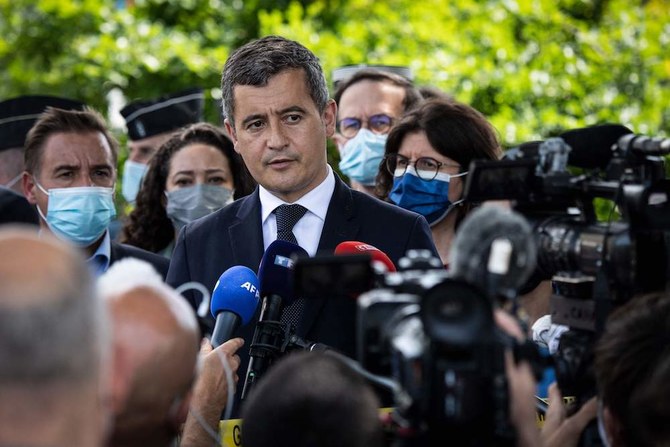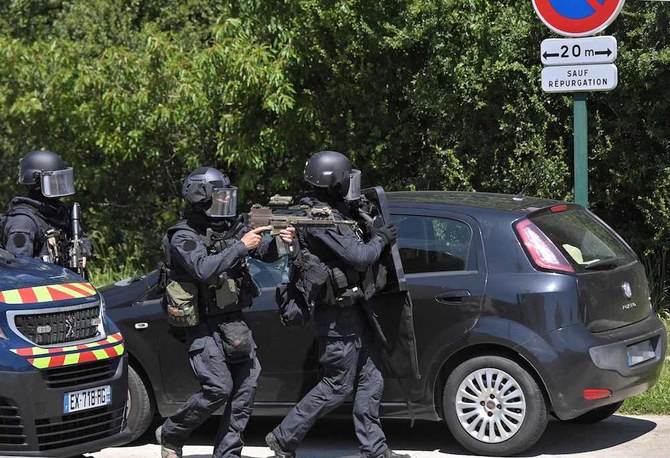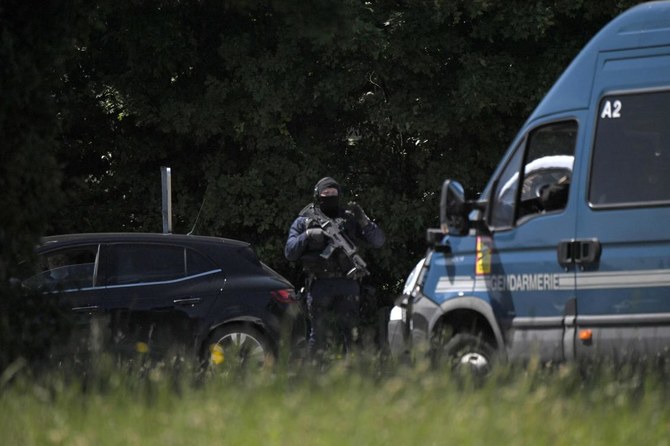LA CHAPELLE-SUR-ERDRE, France: A “known radical” suspected of carrying out a knife attack in France died from injuries sustained in a shootout with police on Friday, hours after he badly wounded a female officer in the latest violence directed at police in recent months.
The man, who was on a terrorist watchlist according to the interior ministry, had been on the run after the attack in La Chapelle-sur-Erdre near the western city of Nantes.
He had also been diagnosed as schizophrenic, according to a source close the investigation.
A total of 250 officers were mobilized in the pursuit, and two gendarmes were wounded during an exchange of fire that resulted in the arrest of the suspect, authorities said, with one suffering from shock.
No motive for the stabbing has emerged, but the attacker was “a known radical and suffering from a very serious psychiatric illness,” one source involved in the investigation said.
After stabbing the officer at a police station, inflicting life-threatening injuries, the suspect stole her service weapon and fled on foot.
The police officer was taken to hospital and later declared to be out of danger.
Interior Minister Gerald Darmanin, arriving at the scene in the afternoon, confirmed that the suspect was known to police as a radical.
“This French-born French national, around 40 years old and known to police services, was released from prison in 2016 where he was pointed out because of radicalization,” leading to his inclusion on a watchlist of potential terrorist sympathizers, Darmanin said.
He was arrested in 2013 for aggravated theft and ordered after his release to follow treatment for schizophrenia.
Darmanin said the suspect, who died shortly after the shootout, opened fire on the officers who then responded.
An AFP photo reporter at the scene said he heard around a dozen rounds discharged in two rapid bursts during the standoff in a residential area.
Special police forces carrying shields and wearing helmets used rubbish bins and bushes for cover as they opened fire.
One witness told AFP he saw a civilian on the ground surrounded by police after the shootout.
Pupils in the area’s primary and middle schools were kept indoors while police tracked the suspect, a city official told AFP.
“We drew the curtains and told the children to lie on the ground. They’ve been there for two hours,” one local teacher told AFP by text message during the manhunt.
La Chapelle-sur-Erdre is a town of 20,000 inhabitants just north of Nantes near the Atlantic coast.
The attack came on the same day that Justice Minister Eric Dupond-Moretti called on French judges to show “firmness” when dealing with people found guilty of attacks on police forces.
French police officers have demanded better protection and harsher punishment for attacks against them after a spate of assaults in the last months which shocked the country.
Earlier this month, officer Eric Masson was shot dead while investigating activity at a known drug-dealing site in the southern city of Avignon.
Masson’s death came after the April 23 killing of Stephanie Monferme, a police employee who was stabbed in the town of Rambouillet outside Paris in the latest extremist attack in France.
There was no immediate indication that the French authorities intended to open a terror probe into Friday’s attack.
Several attacks over the last year have reignited concerns about the spread of radicalism inside France.
In September, a Pakistani man wounded two people with a meat cleaver outside the former offices of satirical magazine Charlie Hebdo which had printed cartoons of the Prophet Muhammad.
On October 16, a young Chechen refugee beheaded teacher Samuel Paty who had showed some of the caricatures to his pupils.
And on October 29, three people were killed when a recently arrived Tunisian went on a stabbing spree in a church in the Mediterranean city of Nice.
In the most severe recent attack against French police, three officers and one police employee were stabbed to death in October 2019 by a IT specialist colleague who was himself then shot dead. He was later found to have shown an interest in extremism.
In France’s deadliest peacetime atrocity, 130 people were killed and 350 were wounded when suicide bombers and gunmen attacked the Stade de France stadium, bars and restaurants in central Paris and the Bataclan concert hall in November 2015.
‘Known radical’ killed in shootout after knife attack on French police
https://arab.news/vbr7g
‘Known radical’ killed in shootout after knife attack on French police

- After stabbing the officer at a police station, inflicting life-threatening injuries, the suspect stole her service weapon and fled on foot
- Minister of the Interior Gerald Darmanin said the suspect, who died shortly after the shootout, opened fire on the officers who then responded
Britain needs ‘AI stress tests’ for financial services, lawmakers say

- Lawmakers urge AI-specific stress tests for financial firms
LONDON: Britain’s financial watchdogs are not doing enough to stop artificial intelligence from harming consumers or destabilising markets, a cross-party group of lawmakers said on Tuesday, urging regulators to move away from what it called a “wait and see” approach.
In a report on AI in financial services, the Treasury Committee said the Financial Conduct Authority and the Bank of England should start running AI-specific stress tests to help firms prepare for market shocks triggered by automated systems.
The committee also called on the FCA to publish detailed guidance by the end of 2026 on how consumer protection rules apply to AI, and on the extent to which senior managers should be expected to understand the systems they oversee.
“Based on the evidence I’ve seen, I do not feel confident that our financial system is prepared if there was a major AI-related incident and that is worrying,” committee chair Meg Hillier said in a statement.
TECHNOLOGY CARRIES ‘SIGNIFICANT RISKS’
A race among banks to adopt agentic AI, which unlike generative AI can make decisions and take autonomous action, runs new risks for retail customers, the FCA told Reuters late last year.
About three-quarters of UK financial firms now use AI. Companies are deploying the technology across core functions, from processing insurance claims to performing credit assessments.
While the report acknowledged the benefits of AI, it warned the technology also carried “significant risks” including opaque credit decisions, the potential exclusion of vulnerable consumers through algorithmic tailoring, fraud, and the spread of unregulated financial advice through AI chatbots.
Experts contributing to the report also highlighted threats to financial stability, pointing to the reliance on a small group of US tech giants for AI and cloud services. Some also noted that AI-driven trading systems may amplify herding behavior in markets, risking a financial crisis in a worst-case scenario.
An FCA spokesperson said the regulator welcomed the focus on AI and would review the report. The regulator has previously indicated it does not favor AI-specific rules due to the pace of technological change.
The BoE did not respond to a request for comment.
Hillier told Reuters that increasingly sophisticated forms of generative AI were influencing financial decisions. “If something has gone wrong in the system, that could have a very big impact on the consumer,” she said.
Separately, Britain’s finance ministry appointed Starling Bank CIO Harriet Rees and Lloyds Banking Group ‘s Rohit Dhawan as “AI Champions” to help steer AI adoption in financial services.














